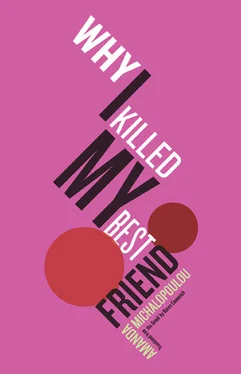One of Anna’s pieces has displaced the poster about the reality of desires. She’s done a whole series: she buys old, romantic landscapes from junk shops — snow-capped peaks, forest streams, houses perched on mountainsides — and alters them with her brush. She adds bits of an anarchist’s city plan, paints in factories or toxic waste, dirties the waters of a lake, ravishes the landscape with acid rain. She’s become a romantic again, just as she was with Angelos. She wants to save nature, like a medieval knight fighting to protect a princess who never expressed the slightest desire to be saved.
Thierry is a Greenpeace activist. Anna goes with him on missions to save endangered animals, follows him to Kuwait and Venezuela to protest oil spills. She sends me postcards with laconic messages, signed “with love.” But I no longer believe in Anna’s love. What she really wants is to show me how well she’s doing, moving from one revolution to the next — from sexual freedom to communism, and now to her new tree-hugging routine.
“What’s wrong with that?” Thanos asks when we’ve shut the door of the attic room, which is now the guest room. Anna’s charmed him, too.
“Neither one of them cares at all about the slaves who work in the fields all day, handling all those toxic chemicals. They swoop in after the fact and act like stars, play the ecological activists, the official protectors of nature.”
“Aren’t they just doing their job?”
“That’s exactly what I’m saying: Anna and Thierry are just doing their job. The two of them are drowning in money, and they spend so much effort trying to hide it.”
“What would you prefer? For them to give it to you?”
“They could give it away. Or just spend it without feeling guilty all the time.”
They painted the apartment themselves, and they remind us of it whenever they can, so we don’t think they’re too bourgeois. They sing the praises of a dirt cheap pizzeria they discovered. After lunch, Anna drags me to a thrift store.
“Well, are you going to tell me about Thanos?” she says, trying on a red kimono with holes at the elbows.
What could I possibly tell her about Thanos? He’s a bank teller, the absolute personification of mediocrity. He only goes out on weekends, he lives with his parents, he provides me with the cover I need. If I tell her about Thanos, I’ll have to tell her about Camus, too, about who I really am, what kind of life I lead. For the first time since my locking-myself-in-the-bathroom phase, I have secrets from Anna. Only back then it was a personal revolution. Now I’m fighting for others.
“He’s good to me,” I say.
“Goodness never mattered to you, Maria. If anything, I’d say you preferred to be a little bit mistreated, you always wanted the ones who pushed you away. .”
“Isn’t it amazing how a person can change?”
She frowns. “You’re up to something,” she says. “There’s something you’re hiding.”
I’m hiding it from my parents, from my art school friends, from the police, and you think you’re going to figure it out?
“I’m bored, Anna, that’s all. My life isn’t as fascinating as yours is.”
So this is how we’ll live in peace: if you ever start to suspect anything, I’ll just break out the passive-aggressive complaints. I’ve been afraid of her all my life, but it turns out she’s a known quantity. She’s predictable.
As Gwendolyn would say, a bird doesn’t change its feathers when winter comes.
“Senegal is amazing,” Thierry says.
I look up from my pizza. “When did you guys go?”
We’re eating at the cheap pizzeria, with some French friends of theirs, such colorless people that you’d think Anna and Thierry chose them on purpose, to set off their own personalities, their brilliance, their joy.
“I went alone, Anna didn’t come. But I came back with Seidu, a Senegalese who was traveling to Europe for the first time, on a scholarship.”
Anna is shaking with laughter. “Do we need this? Do we need that?”
It’s apparently a private joke, because Thierry laughs, too. He explains that Seidu was from a remote village in Senegal that didn’t have a supermarket. When they first went to pick up a few things for his apartment in Paris, Seidu completely lost it. He didn’t know what any of the products were, or what they were used for, and kept asking, “Do we need this? Do we need that?” Seidu, they kept saying, how are you going to go to the bathroom without toilet paper, or cook without oil? And Seidu kept walking, hypnotized, down aisles full of carefully arranged goods.
“Nice joke, guys. It’s so funny, isn’t it, to make fun of people from the third world?” I say, biting angrily into my slice.
Anna shoots me a piercing glance. “Maria, you don’t get it. Seidu’s better off, not us. He gets aesthetic pleasure from the washing machine!” Thierry explains that Seidu used to spend hours in front of the washing machine, entranced by the centripetal movement as it spun. Thanos finds that extraordinarily amusing, too. I feel like shoving the entire pizza in their faces.
Anyone who makes fun of Africa is making fun of me.
We’re dancing tango at a retro café-theater that Thierry and Anna discovered, somewhere in Pigalle. Two drunk prostitutes walk by outside, blowing kisses through the window. Thierry gestures for them to come inside and they lift their skirts in an improvised cancan. Thanos is dancing in place, a bizarre combination of heavy metal and the kalamatiano. I laugh, forget myself, feel normal for a while. But all it takes is for someone’s gaze to linger on me a bit too long for me to freeze in fear. They’re following me. They know.
Camus says I’ve lost it completely. He practically ordered me to go to Paris for a few days. Sometimes I get so scared I think I might stop breathing. It happens at relatively safe moments, like when we’re putting up posters in the streets. When things get serious, I forget my fear. I concentrate on my arms, my legs, I turn into a machine that’s running, or trampling something, someone.
“Want to go pee?” Anna says. Her hair is a mess, she’s bright red from dancing, but she’s gorgeous. A tiny vein pulses on her forehead.
She sits on the toilet, I lean against the wall. Our favorite positions.
“Thierry wants us to go and live in Africa,” she says dreamily.
No, merde! Africa is mine!
“He says if you don’t live where the real problems are, you’re a tourist.”
“Paris has real problems, too. Unemployment, homelessness, racism. .”
“We’re working toward other goals, Maria.”
“Oh, I forgot, none of that’s in fashion. This year everyone’s wearing aboriginals and ecological disasters.”
Anna reaches out a hand and pinches me hard on the arm. “I’ll kick you out of the house! You can go and sleep in the metro, with your precious homeless people!”
“Don’t bother kicking me out, I’ll leave on my own!”
I rush out into the street. The cold Parisian air stings my face, my hands, as if dozens of Annas are pinching me over and over in the dark.
“Are you crazy, merde? Come here!”
She runs after me, catches up, and tosses Thierry’s coat over my shoulders. Her ecological worries have sensitized her to the needs of endangered species — even childhood best friends who, if you leave them for too long without food and water, turn feral.
•
We mend our friendship at the kitchen counter with kir royals and stale chouquettes. Thanos and Thierry have gone to bed, the girls are having their own little party. We’re listening to old French songs on Stamatis’s record player. Anna mimics a few moves from our childhood dance routines, from back when we did arabesques and pretended to leave carnations on the graves of students killed at the Polytechnic.
Читать дальше












